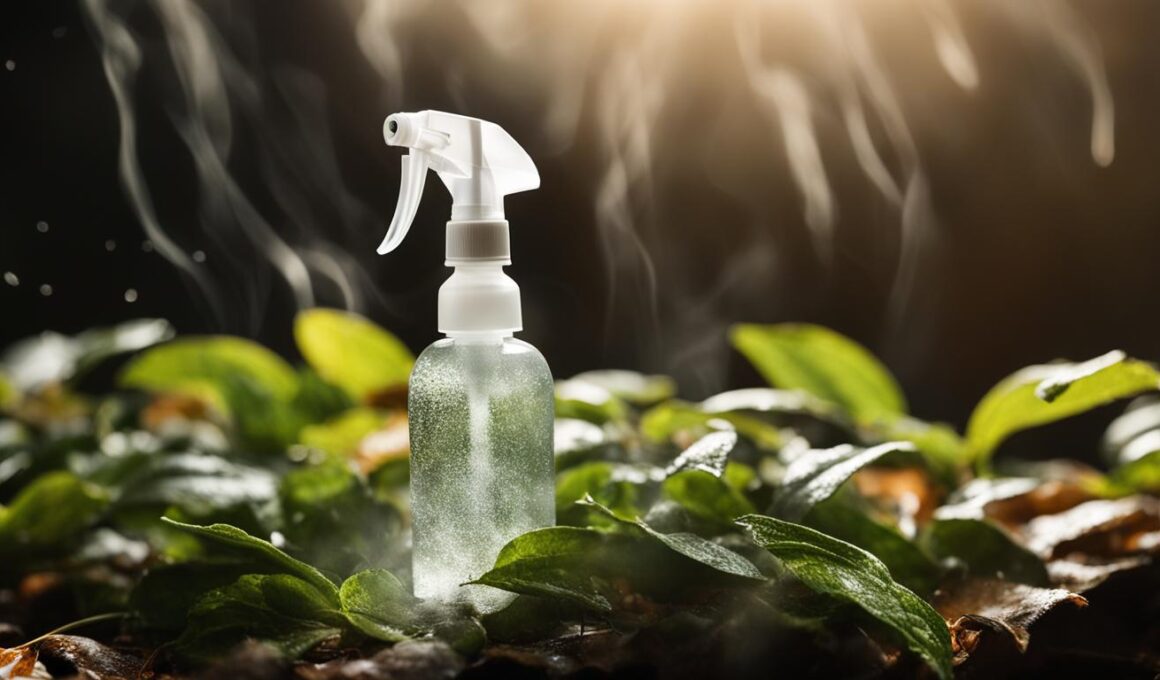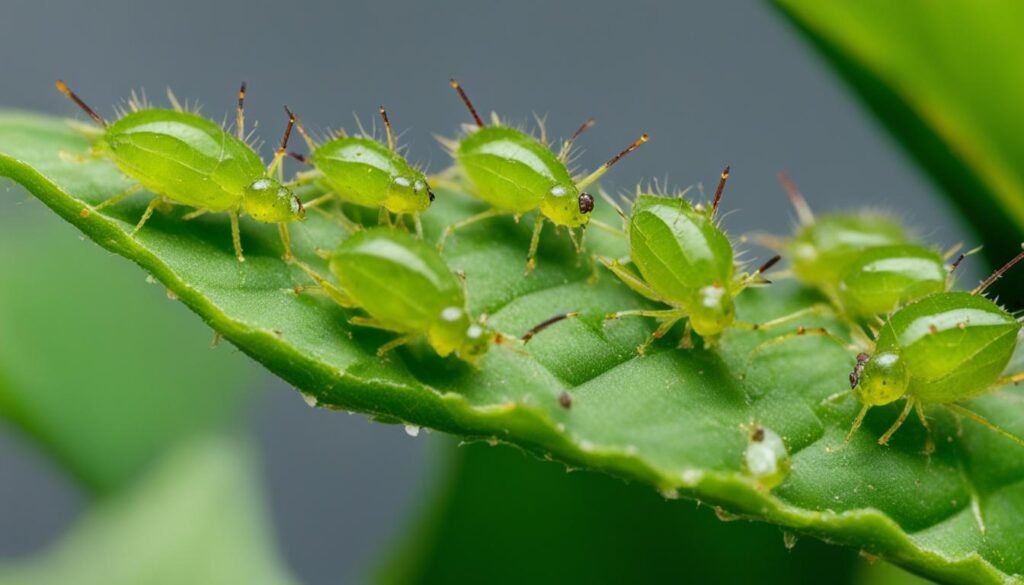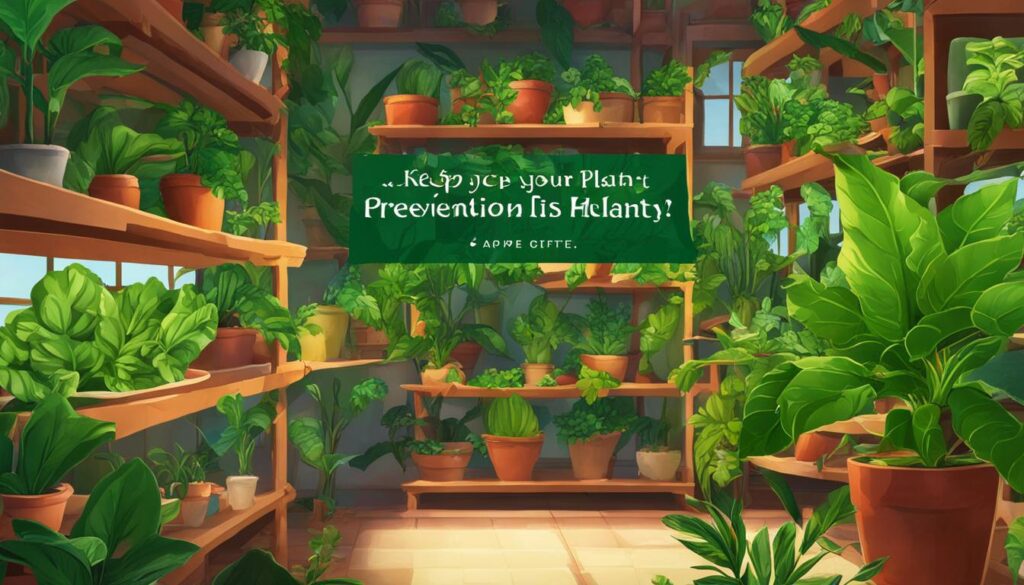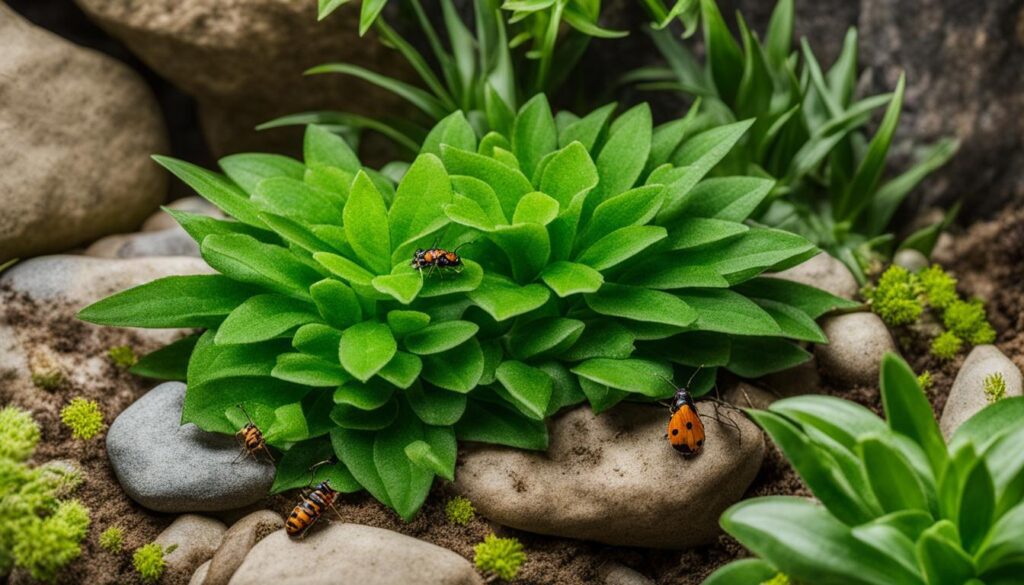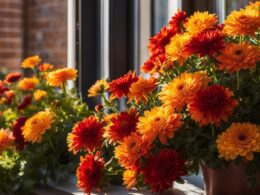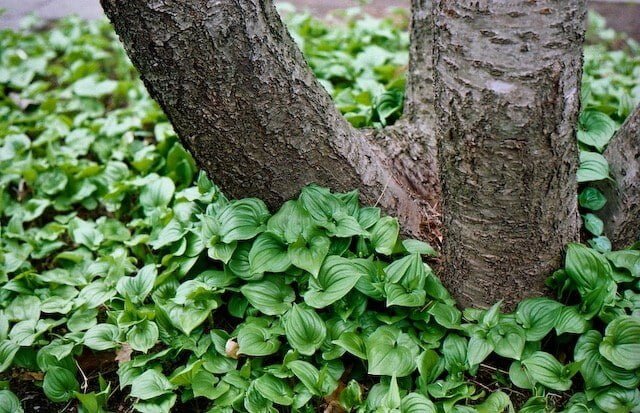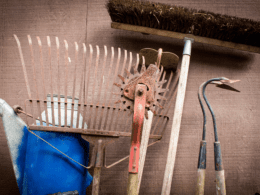Whether you grow a couple of African violets or have a houseful of tropical plants, dealing with houseplant pests is a common challenge. Left untreated, these pests can cause damage and even kill your plants. This comprehensive guide will provide you with effective strategies to eliminate pests using house plant bugs spray. With the right techniques and products, you can protect your greenery and maintain an eco-friendly home.
Key Takeaways:
- House plant bugs spray is a powerful tool for eliminating pests on your houseplants.
- Common houseplant pests include scales, mealybugs, spider mites, whiteflies, aphids, and fungus gnats.
- Prevention is important – inspect new plants, use potting soil, and keep flowers separate from houseplants.
- Natural pest control methods, such as homemade sprays and diatomaceous earth, can be effective and eco-friendly.
- When using insecticides, follow general tips like testing solutions and keeping pets and children away.
Common Houseplant Pests and How to Control Them
Houseplants are a beautiful addition to any indoor space, but they can sometimes attract unwanted pests. Common houseplant pests, such as scales, mealybugs, spider mites, whiteflies, aphids, and fungus gnats, can infest your plants and cause significant damage if not addressed promptly.
Effective pest control begins with identifying the type of pest you’re dealing with. Scales are small, immobile insects that attach themselves to plant stems and leaves. Mealybugs, on the other hand, appear as soft, white, cotton-like clusters. Spider mites are tiny arachnids that create webbing on the plants, while whiteflies are small, flying insects that swarm when disturbed. Aphids are small, pear-shaped insects that feed on plant sap, and fungus gnats are tiny flies that lay their eggs in the moist soil of potted plants.
To control these pests, insecticidal soap and neem oil sprays can be effective. Insecticidal soap works by suffocating and dehydrating pests, while neem oil disrupts their feeding and reproduction. For scales, gently scrape them off with a soft cloth or the edge of a plastic card. Mealybugs can be wiped away with a cotton swab dipped in rubbing alcohol. Spider mites are best controlled by removing heavily infested plants and increasing humidity levels. Whiteflies can be eliminated with weekly applications of insecticidal soap or neem oil. Aphids can be dislodged with a strong spray of water or treated with insecticidal soap or neem oil. Fungus gnats can be controlled by allowing the soil to dry between waterings and using biological insecticides or yellow sticky traps.
By promptly addressing pest infestations and using the appropriate control methods, you can keep your houseplants healthy and thriving. Regularly inspect your plants for signs of pests and take preventive measures, such as isolating new plants, using potting soil, washing leaves, and securing screens and doors. With proper care and attention, you can enjoy a pest-free indoor garden that adds beauty and freshness to your home.
Prevention Tips for Houseplant Pest Infestations
Preventing houseplant pest infestations is crucial to maintaining the health and beauty of your indoor plants. By following these prevention tips, you can keep your plants pest-free and thriving.
- Inspect Plants: Regularly inspect your plants for any signs of pests, such as webs, discoloration, or sticky residue. Catching infestations early will make them easier to control.
- Isolate New Plants: When bringing new plants into your home, keep them separate from your existing plants for about six weeks. This quarantine period will help prevent the spread of any potential pests.
- Use Potting Soil: Instead of using outdoor soil, opt for commercially prepared potting soil when repotting your plants. Outdoor soil may contain pests that can infest your indoor plants.
- Wash Leaves: Regularly wash the leaves of your indoor plants with a damp cloth or sponge. This will help remove dust and discourage pests from settling on the foliage.
- Keep Flowers Separate: If you have cut flowers displayed indoors, keep them separate from your houseplants. Flowers can attract pests that may then spread to your plants.
- Secure Screens and Doors: Make sure your window screens are intact and your doors are properly sealed to prevent pests from entering your home. Pests can easily hitch a ride on pets or gusts of wind.
By implementing these prevention tips and practicing proper plant care, you can significantly reduce the risk of houseplant pest infestations. Remember to stay vigilant and address any signs of pests promptly to protect your plants and maintain a pest-free environment.
The Importance of Prevention
Preventing houseplant pest infestations is always better than dealing with an outbreak. Not only will prevention save you time and effort in the long run, but it will also help keep your plants healthier and more resilient. Healthy, pest-free plants are more likely to thrive and can better withstand environmental stressors.
Integrated Pest Management
Prevention is a key principle of integrated pest management (IPM) for houseplants. IPM focuses on using a combination of cultural, biological, and chemical methods to manage pests in a sustainable and eco-friendly way. By incorporating prevention into your overall houseplant care routine, you can effectively minimize the need for chemical treatments and create a healthier environment for both your plants and the natural ecosystem.
Natural Pest Control Methods for Houseplants
When it comes to protecting your houseplants from pests, natural pest control methods can be just as effective as chemical pesticides. Not only are these methods safer for your plants, but they are also eco-friendly. Here are some DIY pest control solutions using common household ingredients:
- Dish soap: Create a spray by mixing a few drops of dish soap with water. This solution can suffocate pests like spider mites, mealybugs, and aphids.
- Vegetable oil: Mix a teaspoon of vegetable oil with a quart of water and spray it on your plants. The oil can block the air holes of pests and disrupt their metabolism.
- Cinnamon: Sprinkle cinnamon on the top layer of your potting soil to deter fungus gnats. Cinnamon can also help control fungal growth in the soil.
- Diatomaceous earth: Sprinkle food-grade diatomaceous earth on your plants to dehydrate and kill pests. Be sure to use the type specifically labeled for pest control.
- Garlic and chilli spray: Blend garlic cloves and chili peppers with water, then strain it into a spray bottle. This spray can repel many common pests.
- Khakibos: Infuse khakibos leaves in water overnight, strain the leaves, and use the infused water as a spray. Khakibos is a natural pest control method native to South Africa.
These natural pest control methods can be easily made at home and are safe to use around your pets and children. By incorporating these solutions into your regular plant care routine, you can keep your houseplants healthy and pest-free.
General Tips for Using Natural and DIY Insecticides
When it comes to protecting your houseplants from pests, natural insecticides can be a safe and effective solution. Here are some general tips to keep in mind when using natural and DIY insecticides:
- Water your plants regularly: Proper watering is essential for the overall health of your plants and can help them better resist pest infestations. Make sure to follow the specific watering requirements for each type of plant.
- Remove infested leaves: If you notice any leaves that are heavily infested with pests, promptly remove them from the plant. This will help prevent the spread of pests to other parts of the plant.
- Spray out of direct sunlight: When applying natural insecticides, it’s best to do so in an area that is not exposed to direct sunlight. Direct sunlight can cause the spray to evaporate quickly and may also lead to leaf damage.
- Keep pets and children away: While natural insecticides are generally safe for use, it’s always important to keep pets and children away from the treated plants. This will help prevent accidental ingestion or contact with the spray.
- Test the solution on leaves: Before applying the natural insecticide to the entire plant, it’s a good idea to test it on a small area, such as a few leaves. This will allow you to check for any adverse reactions or damage before treating the entire plant.
By following these general tips, you can use natural insecticides effectively and protect your houseplants from pests without harming the environment.
Conclusion
In conclusion, effective houseplant pest control is crucial in maintaining the health and beauty of your indoor greenery. By employing the strategies outlined in this guide, you can successfully eliminate pests and ensure the longevity of your plants.
It is important to remember that eco-friendly solutions should be prioritized whenever possible. By opting for natural pest control methods and using house plant bug sprays that are safe for the environment, you can create a sustainable and eco-conscious home.
Implementing preventive measures, such as regular plant care, thorough inspections, and isolation of new plants, will help you avert potential infestations. Additionally, practicing general tips for using natural insecticides, such as testing solutions and spraying out of direct sunlight, will optimize the effectiveness of your pest control efforts.
With a proactive approach and the right tools at your disposal, you can enjoy an abundant and thriving indoor garden, free from the nuisance and damage caused by pests. Take pride in your eco-friendly practices, and continue to nurture your houseplants for years to come.
Can I Use Home Remedies for Houseplant Bugs Instead of Bug Spray?
Before reaching for bug spray, consider using effective home remedies for houseplant bugs. Try wiping off bugs with a mix of water and dish soap, or spraying plants with a mixture of neem oil and water. You can also introduce natural predators like ladybugs to help control the bug population.
FAQ
What are some common houseplant pests?
Common houseplant pests include scales, mealybugs, spider mites, whiteflies, aphids, and fungus gnats.
How can I control houseplant pests?
Houseplant pests can be controlled using insecticidal soap and neem oil sprays. Scales can be removed by gently scraping them off, while mealybugs can be wiped away with rubbing alcohol. Spider mites can be controlled by increasing humidity and removing heavily infested plants. Whiteflies can be eliminated with weekly applications of insecticidal soap or neem oil. Aphids can be dislodged with water or treated with insecticidal soap or neem oil. Fungus gnats can be controlled by allowing the soil to dry between waterings and using biological insecticides or yellow sticky traps.
How can I prevent houseplant pest infestations?
To prevent houseplant pest infestations, provide your plants with proper care, thoroughly inspect new plants for signs of pests, isolate new plants from existing plants, use commercially prepared potting soil when repotting, regularly wash leaves, keep cut flowers separate from houseplants, and ensure screens and doors are secure.
What are some natural pest control methods for houseplants?
Natural pest control methods for houseplants include homemade sprays using ingredients like dish soap and vegetable oil, using cinnamon to deter fungus gnats, using diatomaceous earth to dehydrate pests, using garlic and chilli spray to repel pests, and using khakibos as a natural pest control method.
What are some general tips for using natural and DIY insecticides on houseplants?
When using natural and DIY insecticides on houseplants, remember to water your plants regularly, avoid spraying pesticides on burned or stressed leaves, remove heavily infested leaves, spray in an area away from direct sunlight, keep pets and children away, test the solution on a few leaves before applying it to the entire plant, and dilute the solution if necessary.





